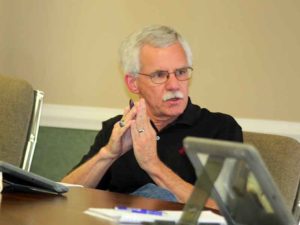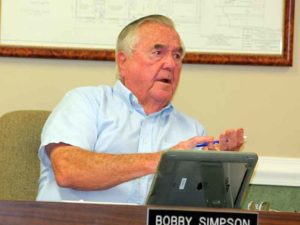Council may consider occupational tax hike at next Tuesday’s meeting
By JIM BROOKS
Nelson County Gazette / WBRT Radio
Wednesday, Aug. 3, 2016, 11 p.m. — Faced with the continued depletion of the City of Bardstown utility reserves by using that money to balance the city general fund, the Bardstown City Council discussed the what action it should consider taking at its working session Tuesday night.
Referring to a recently compiled list of future utility projects, Councilman Fred Hagan told the council that he would like to see the council put an end to the use of the utility proceeds to fund the city general fund.
The general fund pays for services that don’t generate revenue, like fire and police protection, sidewalks and street repairs, etc. For many years the city has used a portion of its utility proceeds to help fund the general fund. But the general fund needs have grown in the past several years — particularly with the creation of a fulltime fire department.
If the general fund continues to drain the city’s utility reserves, there won’t be enough money to fund the city utility upgrades when they are needed. In order to make sure the utilities have sufficient funding, Hagan asked the council consider creating additional revenue to replace the utility funds.
Councilman Bobby Simpson disagreed with the idea of completely eliminating the use of the utility funds, noting that doing so has been discussed since he first won a seat on the council.
Simpson said the council could have cut $1 million from the budget it just passed.
“I know that’s hindsight — its here and we have to come up with the money,” he said. “I think our budget was too high this year … I think we need to manage more and spend less.”
Councilman Roland Williams told the council that when it approved the fulltime fire department it failed to also create a funding mechanism to create the needed $450,000 to pay for it. Continuing to drain the utility reserves may eventually impact the city’s ability to borrow money, he said.

Councilman Bill Buckman told the council members it was their responsiblity to find a way to fund the 2016-17 budget.
Councilman Bill Buckman said the council approved the city budget and it is the council’s responsibility to come up with a way to fund it. He rejected suggestions that the budget needed to be cut.
“You’ve got to keep your equipment up, you have to keep the city progressing,” he said. “You’ve got to find out where this money is going to come from to keep up the services that the people of Bardstown expect.”
Councilwoman Kecia Copeland also pointed to the lack of a funding mechanism to fund the fire department as the start of a “downward spiral” that has required greater dependence on the utility reserves.
Chief Financial Officer Tracey Hudson told the council that the city depends on the utility reserves to cover the various utilities’ capital projects. If the reserves aren’t there to pay for those projects, the city could be forced to borrow the money.
After additional discussion, Williams and Buckman agreed with Hagan it was time to stop the utility fund transfers for the benefit of funding future utility projects. The other three council members — Francis Lydian, Simpson and Copeland — disagreed.
OCCUPATIONAL TAX HIKE. Despite the evenly divided council opinions, the discussion moved to funding mechanisms that could replace the utility transfers.
Hagan proposed raising the occupational tax from .5 cents per dollar of income to .75 cents per dollar of income, which would create more than $1 million in new revenue.
If the council approves the tax hike, it won’t take effect until Jan. 1, 2017, which means the current city budget will add six months of the new revenue before the fiscal year ends June 30, 2017.
Buckman, Williams and Hagan said they would support the move. Copeland said if the council must raise taxes, it needs to do a better job of explaining the reason for the move to the public and be able to show on paper why more money is needed.
“I don’t mind voting for a tax if its legitimate, if its right and if its for the community” she said. “I truly believe you have to let the people know why this is being done.”
Copeland said the budget problem began when the current council members’ terms began in Jan. 2014. Rather than voting to meet the June 30 budget deadline, she said the council should have delayed its approval until it reached an agreement after analyzing and evaluating the budget.
Copeland said that letting residents know why a tax increase is necessary was just “the right thing to do.”
“If you can’t be accountable to the people that see you in the streets everyday, and if you can’t explain to them why you need to raise their taxes, then you shouldn’t be a council person.”
NEXT UP. The council will consider first reading of an ordinance sponsored by Hagan to raise the occupational tax to .75 at its meeting next Tuesday.
-30-







